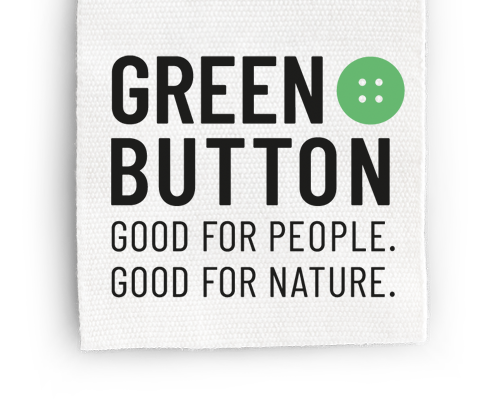German Development Minister Gerd Müller unveils Green Button government-run textile label
Berlin – German Development Minister Dr Gerd Müller today unveiled the Green Button government-run textile label. It is launching with 27 companies, all of whom have satisfied the requirements of the textile label. 26 other companies are currently undergoing the auditing process.
German Development Minister Gerd Müller: ‘Globalisation began in the 19th Century in the textile industry. It’s now time for fair globalisation to emerge in the same sector. We’re setting the bar high with the Green Button and showing that fair supply chains are feasible. As of today, no one can dispute this any longer, as proven by all the companies taking part.’
German Development Minister Gerd Müller: ‘That is what is special about the Green Button. The entire company is audited. Offering individual products for show is not enough. No other scheme conducts such detailed checks.’
The Green Button will initially cover the two key production steps, namely sewing and dyeing, all of the 100 billion garments worldwide go through this stage, which involves 75 million workers. Additionally, it was during this production stage that the Rana Plaza textile factory collapsed.
Over the next few years, the Green Button will be extended to cover other production steps, such as cotton growing. The social and environmental criteria will also be developed on an ongoing basis, for example, to include living wages. This will be supported by an expert advisory council comprising representatives of industry, the science and research community, and civil society.
German Development Minister Gerd Müller: ‘Fair fashion is a mega trend. It’s important to three quarters of consumers, but so far there has been a lack of guidance. This is now changing with the Green Button. With each purchasing decision we make, we can contribute to a fair globalisation process in which people and the environment are not exploited for our benefit as consumers, and help promote humanity and human rights.’
The following companies are signed up:
27 companies have already passed the audit of the Green Button label, including start-ups, SMEs, recognised sustainability pioneers and large corporations: Alma & Lovis, Aldi Nord, Aldi Süd, Brands Fashion, CharLe, Derbe, Dibella, Engel, Feuervogl, Hans Natur, hessnatur, Hopp, Kaufland, Kaya&Kato, Lidl, Manomama, Melawear, Millitomm, Modespitze Plauen, Phyne, Posseimo, Rewe Group, Schweickardt Moden, Tchibo, Trigema, Vaude, 3 Freunde.
26 more companies are currently undergoing the auditing process, including Hugo Boss, the Otto Group and smaller firms such as Socks4Fun.
What people are saying about the Green Button:
Klaus Müller, Executive Director, Federation of German Consumer Organisations (vzbv) ‘The Green Button has the potential to help consumers better navigate the maze of textile labels. Whether or not the label meets the high expectations and resonates with consumers crucially depends on the degree of open communication during its launch.’
Barbara Meier, Textile Ambassador and Germany’s Next Top Model: ‘We should never underestimate the power we have as consumers. At the end of the day, an entire industry gears itself also to meeting our wishes and needs.’
Ralf Scheller, Chief Operating Officer, TÜV Rheinland AG: ‘With the Green Button, the German Government is sending an important signal. It’s a step in the right direction towards sustainability. Other branches of industry can follow suit.’
Ulrich Lilie, President, Diakonie Deutschland: ‘As the Diakonie, we welcome this initiative by BMZ, as we intend to step up our work in the area of sustainable textiles in future. After all, we use a great deal of bed linen, towels and work clothes in our facilities. As such, this is an extremely relevant issue for the Diakonie.’
Thomas Linemayr, CEO, Tchibo: ‘We welcome the Green Button’s goal of making it as easy as possible for consumers to choose more sustainable products and auditing the companies themselves for their overall commitment to sustainability. We’re proud to be there from the beginning.’
Alexander Birken, CEO, Otto Group Holding: ‘I welcome the initiative of Gerd Müller, Federal Development Minister, to offer consumers more guidance when it comes to buying sustainable, fairly manufactured textiles. The Otto Group actively supports this goal and the first companies within the group are already taking up the challenge of certification.’’
Rayk Mende, Managing Director Corporate Responsibility, Aldi Nord: ‘With the Green Button, we are providing our customers with additional guidance when shopping.’
Wolfgang Grupp junior, Trigema: ‘The Green Button is an important label of confidence for us. One that shows us all that Trigema is the brand of responsibility.’
Jürgen Schweikardt, Owner, Schweikardt Moden GmbH: ‘Congratulations – the Green Button is moving in the right direction!’
Antje von Dewitz, Managing Director, Vaude: ‘We’re seeing that a growing number of people want to buy their clothes with a clean conscience. The Green Button offers them clear guidance by providing a government-run label that identifies environmentally-friendly and fairly produced products. We’re delighted to be involved at the start and to have obtained Green Button certification for 98 per cent of VAUDE’s current clothing line.’
Andrea Ebinger, CEO, hessnatur ‘We welcome the fact that BMZ and its dedicated team are now advancing the topic of sustainability in fashion, something that we’ve been practising as a matter of conviction for over 40 years. We see the Green Button as a potential pioneer of standards for environmentally-friendly and socially fair textile production for the whole of Europe, if not beyond.’
Dr Raoul Kirmes, Deutsche Akkreditierungsstelle GmbH (DAkkS - German national accreditation body) (‘Certifier of certifiers’): ‘DAkkS supports the government-run Green Button certification label. It provides consumers with a reliable means of identifying socially-sound and environmentally-friendly sustainable textiles that is monitored by the German government. The introduction of government control over certification bodies of consumer-related labels was long overdue, as consumers can only make sustainable purchasing decisions if they have confidence in the labels and certificates. As a global system, the Green Button meets internationally harmonised ISO standards and, by extension, complies with EU and WTO legislation. In the textile sector especially, where supply chains are fully globalised, this is essential.’
Klaus Müller, Executive Director, Federation of German Consumer Organisations (vzbv) ‘Despite some initial difficulties, the Green Button is moving in the right direction and I believe it should be given a chance to establish itself and develop its work further. Such development is necessary in order to not only scrutinise what goes on in the textile factories and dyeworks, but also require evidence of compliance with environmental, social and human rights standards from actors throughout the supply chain (from the cotton field to the clothes hanger, as Minister Müller often says). The goal of achieving living wages, established in the preamble to the Green Button statute, must be tackled in the near future.
It’s good to see BMZ also advocating for a law on supply chains. The Green Button is not inconsistent with this law, as BMZ has made it clear that the criteria for Green Button certification must always be significantly more stringent than the statutory requirements.
As a government-run meta-label, the Green Button is important, as it will soon leave the German Government, federal states and local authorities without any excuses and ensure that they only purchase textiles (uniforms, lab coats, bed linen, curtains etc.) bearing the Green Button label. It could also help consumers to better navigate the maze of textile labels.’
Pirmin Spiegel, Director General, MISEREOR: ‘We welcome Minister Müller’s actions in using the Green Button textile label to further raise awareness among the German public of the topic of sustainable fashion and thereby highlighting the urgent need for improvement in conditions within the textile industry.’

